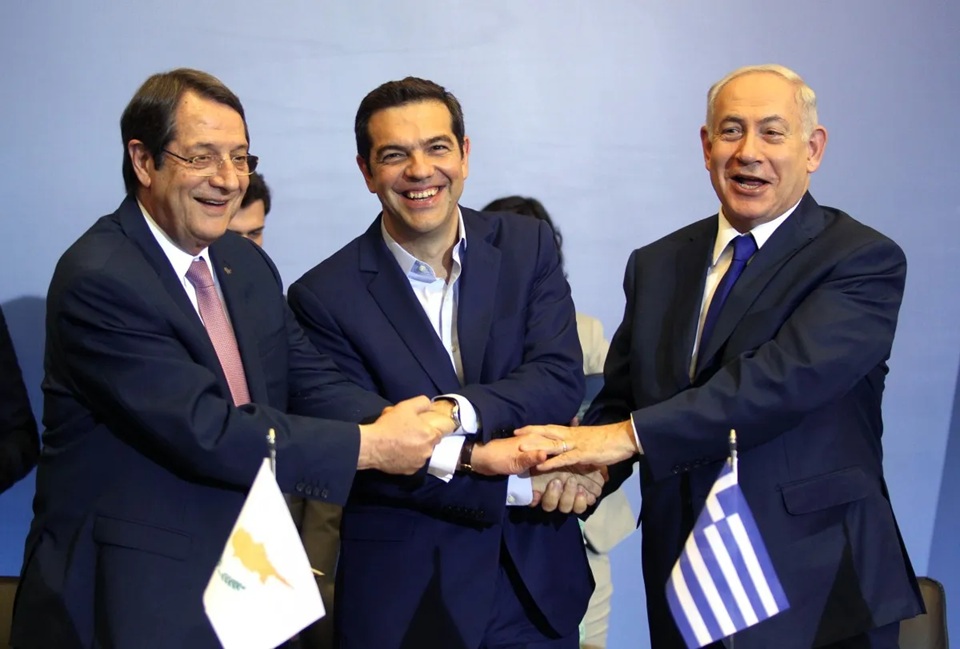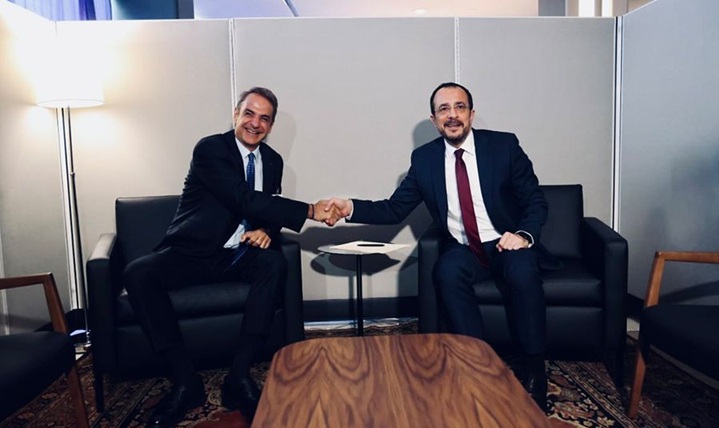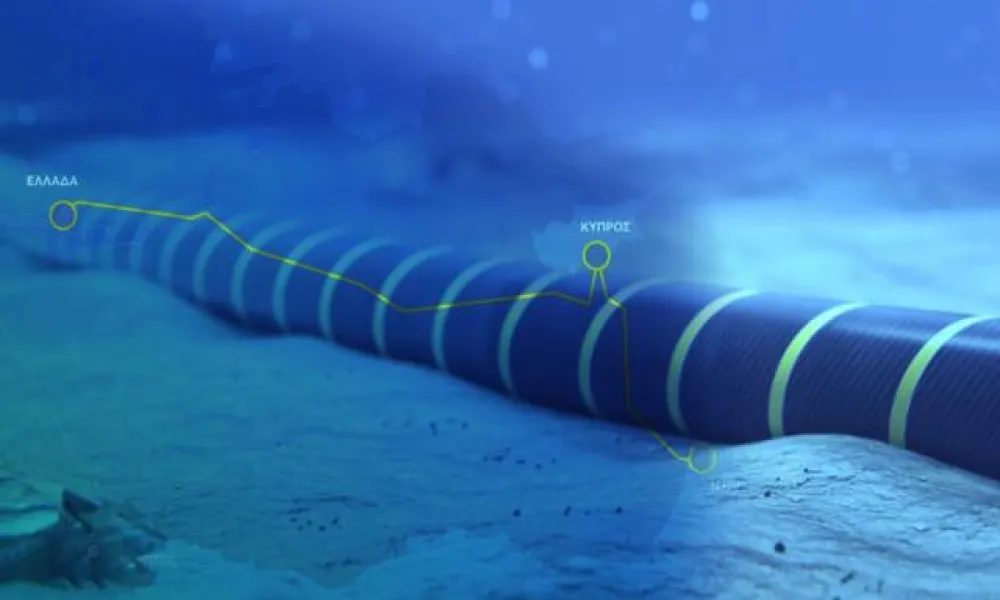The ambitious project to link the electricity grids of Cyprus, Greece and Israel through the construction of the world’s longest undersea power cable stretching 1,200 kilometres was first unveiled in January 2012 in Athens by the DEI-Quantum consortium, chaired by Cypriot businessman Nasos Ktorides. Estimated at €1.5 billion, the project’s technical studies were expected within a year, paving the way for governmental support from the three participating countries deemed essential for its success.
2013–2019: The EuroAsia “dowry”
In the years that followed, the project oscillated between progress and stagnation. Despite serious doubts over its feasibility, it achieved key milestones:
-
Inclusion in the EU’s “Connecting Europe Facility” list of 250 eligible projects (2013).
-
Full political support from Cyprus, Greece and Israel, sealed at the 2016 Nicosia trilateral summit (Anastasiades, Netanyahu, Tsipras).
-
EU funding of €14.5 million in 2017 for studies and a cross-border cost-sharing agreement between the Cypriot and Greek regulators.
-
Allocation of state land in 2018 for converter and landing stations, followed by planning and construction permits in 2019–2020.
Initial schedules set cable laying for early 2019, commercial use of the Cyprus–Crete segment by end-2021, and completion of the Cyprus–Israel link by 2022. In 2019, EuroAsia Interconnector announced it was in the final stage of construction tenders.

Request for state guarantees
By 2020, with political backing and EU eligibility secured, EuroAsia sought government guarantees covering the €1.5 billion construction cost. The Ministry of Finance rejected the request outright, citing the project’s private nature and need for independent investors and lenders.
When efforts to attract investment failed, the company returned with a new funding request. Around the same time, former government officials joined the project in advisory roles, among them former Justice Minister Ionas Nicolaou (legal adviser), former Foreign Minister Ioannis Kasoulides (head of strategic council), and former Transport Minister Marios Demetriades (consultant).
A compromise was eventually found: limited Cypriot participation of €100 million, later secured as a loan via the Recovery and Resilience Facility. Then-Finance Minister Constantinos Petrides described this as the least risky exposure for the Cypriot economy.
Finance Ministry: 'Project not mature'
Before final approval, the Finance Ministry and the Directorate-General for Growth requested financial data to assess viability.
Their March 2021 report found that EuroAsia had not provided the requested studies or updates. Conclusions included:
-
The project was not mature.
-
Financing and design were incomplete.
-
The developer lacked sufficient technical expertise.
-
No firm commitments for energy supply or demand existed.
-
No alternative, lower-cost options had been assessed.
-
EU institutions had expressed reservations.
Conditional approval and EU funding
Despite these warnings, the Cabinet approved participation, with President Anastasiades and Energy Minister Natasa Pilides expressing full political support.
The proposal emphasised benefits such as ending energy isolation, ensuring grid stability, enhancing geopolitical standing, and integrating Cyprus into the EU electricity network.
The approval carried conditions:
-
The developer must secure EU funding.
-
A government project officer would submit quarterly progress reports.
-
Two government representatives would join the company’s board.
In July 2021, the European Commission approved a €100 million grant under the Recovery and Resilience Plan. The same day, EuroAsia announced it had received binding offers and would begin construction. The Greek Independent Power Transmission Operator (ADMIE) joined as technical adviser to support project design and financing.
In January 2022, the EU’s Connecting Europe Facility approved a major €657 million grant, expected to unlock investor interest.
Shifting deadlines and rising costs
By October 2022, at a high-profile foundation-stone ceremony attended by EU Energy Commissioner Kadri Simson, President Anastasiades announced that the Cyprus–Greece segment would be completed by 2027 and operational in early 2028.
However, by mid-2023, tensions emerged between Cyprus and Greece. While Energy Minister George Papanastasiou maintained the government’s supportive stance, growing doubts over financing and cost overruns now estimated at €1.9 billion, prompted new reviews. The European Investment Bank (EIB) later rejected the loan request, recommending instead a large-scale battery installation across Cyprus.
ADMIE takeover and renaming to GSI
Amid mounting pressure, EuroAsia failed to meet early payments to the Norwegian contractor Nexans. By October 2023, ADMIE - 76% owned by the Greek state - fully acquired the project for €48 million, renaming it the Great Sea Interconnector (GSI). ADMIE promised completion by 2027, backed by strong finances and expertise.
In late 2023, ADMIE presented its cost–benefit study to President Christodoulides, projecting a final investment decision by early 2024. Energy Minister Papanastasiou voiced optimism about investor interest and bridging the €1.2 billion funding gap, but Finance Minister Makis Keravnos remained cautious.
ADMIE later confirmed the first payment of €55 million to Nexans, funded through the EU grant, and reported interest from Israeli and UAE investors, though they awaited a clear commitment from Cyprus.
RAEK rejection and growing friction
On 2 July 2024, Cyprus’ energy regulator RAEK rejected ADMIE’s request to recover investment costs during construction, ruling that such returns would apply only after commercial operation. ADMIE warned that “if the decision is not reversed, the project will stop.”
A subsequent ADMIE-commissioned study by Exergia and the National Technical University of Athens reaffirmed the project’s viability and claimed it could cut Cypriot electricity bills by 30% by 2030. Nevertheless, Nexans warned of work suspension in August 2024.
Memorandum of Understanding
In an effort to ease tensions, President Christodoulides met Prime Minister Mitsotakis in Athens on 19 September 2024, reaffirming political support. A day later, the two energy ministers signed a Memorandum of Understanding on the interconnection.
Under the agreement, Cyprus would contribute €25 million annually (a total of €125 million until 2029), covering usage fees during construction - to be paid by the state, not consumers.
In case of cancellation due to geopolitical risk, losses would now be shared equally (50–50) between Cyprus and Greece, replacing the previous 67–33 arrangement.

Resounding 'no' by advisors
Independent due diligence reports by Curtis and Charles River delivered in November 2024 halted further progress.
Curtis concluded that Cyprus should not make any investment commitment before securing legal parity, access to information and regulatory oversight. The report warned that Cyprus currently lacked governance rights or contractual protection against cost overruns or EU funding withdrawal.
Charles River’s economic and technical review also advised against commitment until further analyses were complete, citing uncertainty over the project’s economic viability and benefits for consumers.
A frozen project and open questions
As 2025 draws to a close, the project remains frozen despite renewed pledges by Christodoulides and Mitsotakis. The European Public Prosecutor’s Office (EPPO) is investigating possible criminal offences related to the project, raising concerns over the €657 million EU grant.
Meanwhile, disagreements persist between ADMIE and RAEK over recognised expenses — €82 million versus ADMIE’s claim of €251 million. If the project is cancelled, Cyprus could face liabilities ranging from €41 million to €125 million, depending on the final ruling.
The European Commission has stepped in as mediator, with Energy Commissioner Dan Jørgensen hosting talks between the Cypriot and Greek energy ministers. A follow-up trilateral meeting is scheduled for 12 November in Brussels.
Two schools of thought
The future of the EuroAsia–GSI project has divided policymakers and experts.
One camp insists that geopolitical and energy security imperatives demand completion “at any cost”. The other, supported by technical studies, argues that the project is not economically viable and should have been abandoned after the EIB’s rejection.
Meanwhile, renewable energy producers have been fighting the project for some time, citing the uncertainties that still exist, but mainly fear that external competition will cause the kilowatt-hour tariff to fall very low, resulting in a drastic reduction in their profits.
